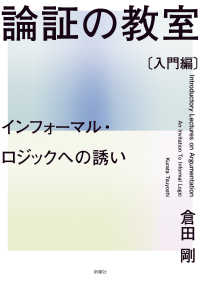- ホーム
- > 洋書
- > ドイツ書
- > Humanities, Arts & Music
- > History
- > antiquity
Description
This commentary on the Persa is the first full-length treatment of the play in English. The commentary, in addition to collecting comparanda, explaining difficult and corrupt passages, providing necessary cultural and historical context, etc., places particular emphasis on explaining Plautus' language (especially alliteration, proverbs, etymology, the relationship between the colloquial and literary registers of Latin, word choice, and parallels with modern European languages), the staging of the drama, the development of the characters and their relationships, music, and the issues of slavery and gender. The goal throughout is to render the play more accessible to a wider audience of readers. This commentary provides a thoroughly modern reading of Plautus' Persa. This commentary on the Persa is the first full-length treatment of the play in English. The commentary, in addition to collecting comparanda, explaining difficult and corrupt passages, providing necessary cultural and historical context, etc., places particular emphasis on explaining Plautus' language (especially alliteration, proverbs, etymology, the relationship between the colloquial and literary registers of Latin, word choice, and parallels with modern European languages), the staging of the drama, the development of the characters and their relationships, music, and the issues of slavery and gender. The goal throughout is to render the play more accessible to a wider audience of readers. Joseph Conlon is Professor of Classics, Director of the Greek Program, and Dean of Graduate studies at Ralston College, USA. He specializes in language acquisition and pedagogy, and is also a translator of katharevousa literature. Dr. Bernhard Zimmermann ist Professor für griechische Literatur an der Albert-Ludwigs-Universität Freiburg.







